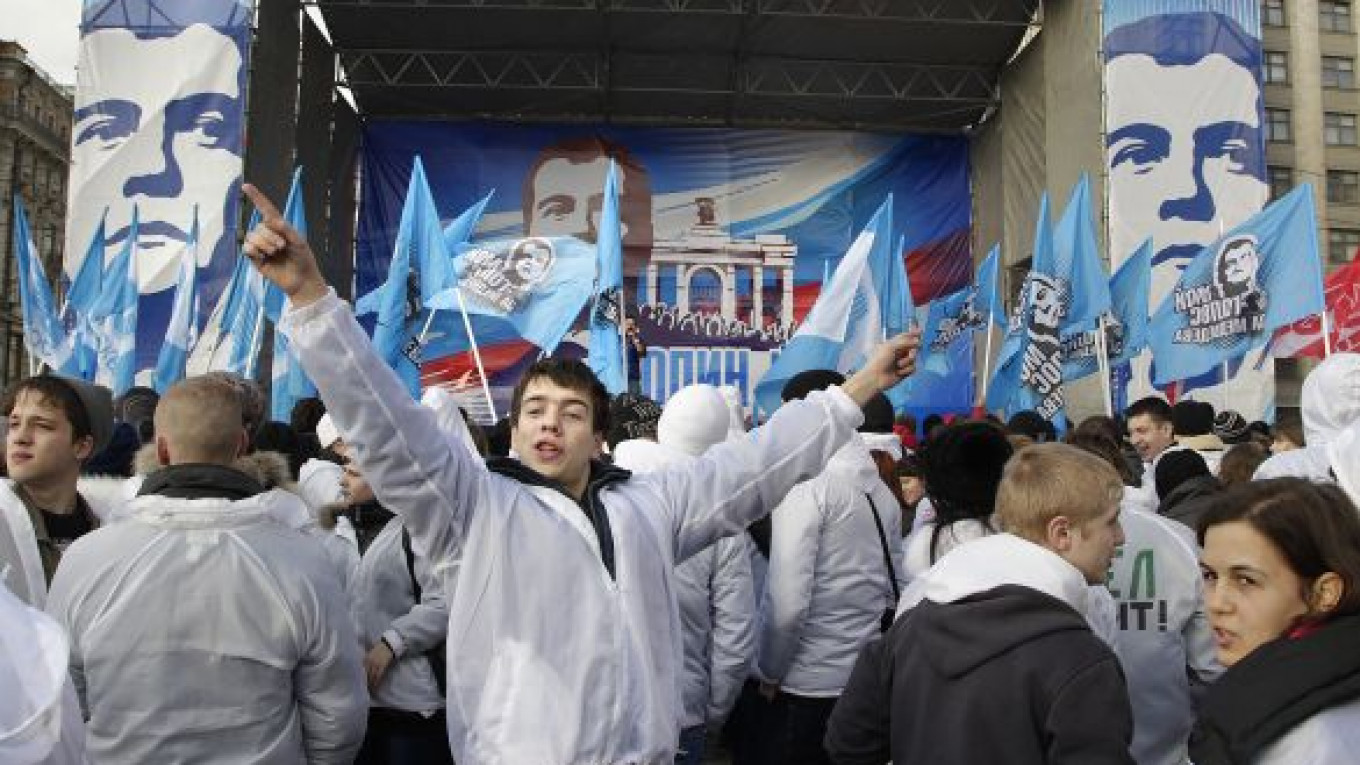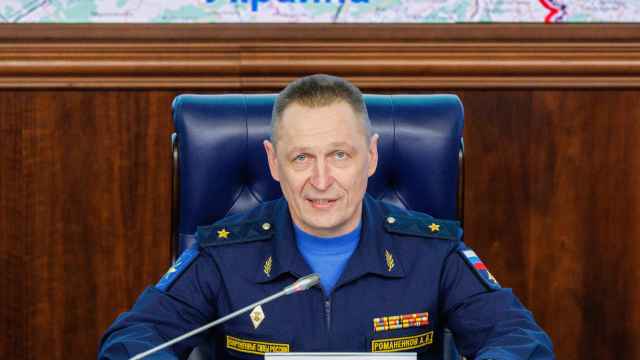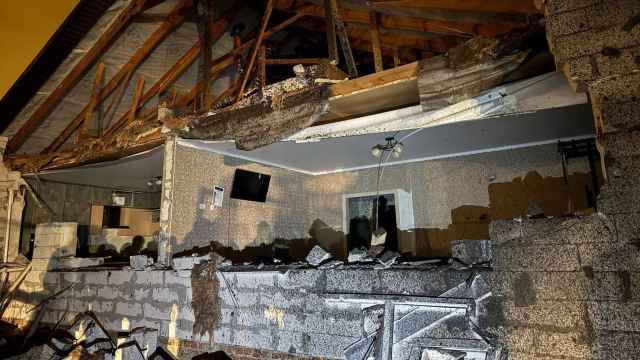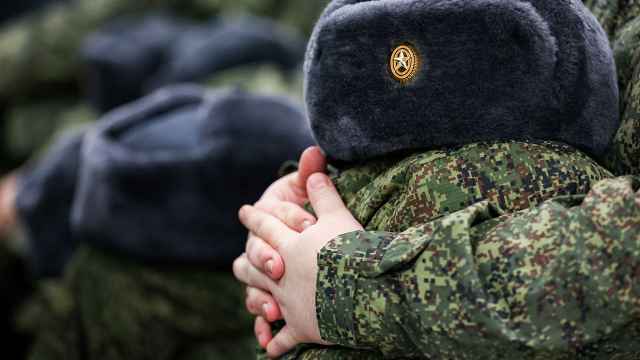Preliminary data from the Central Elections Commission show United Russia roundly sweeping elections for regional parliaments in voting Sunday, although in some places with only narrow margins of victory.
Astrakhan
United Russia 44.2%
LDPR 21.3%
Communist Party 19.8%
A Just Russia 8.9%
Kamchatka
United Russia 36.9%
Communist Party 23.7%
A Just Russia 17.9%
LDPR 17.5%
Jewish Autonomous District
United Russia 49.7%
Communist Party 20.1%
LDPR 17.1%
A Just Russia 9.7%
Karelia
United Russia 30.1%
A Just Russia 22.3%
Communist Party 19.1%
LDPR 18.3%
Yabloko 7.1%
Krasnoyarsk
United Russia 44.8%
LDPR 19.8 %
Communist Party 17.6%
A Just Russia 10.8%
Murmansk
United Russia 33.2%
Communist Party 22.9%
A Just Russia 21.6%
LDPR 19.5%
Oryol
United Russia 40.6%
Communist Party 32.4%
LDPR 13.3%
A Just Russia 9.8%
Perm
United Russia 38.1%
Communist Party 20.1%
LDPR 17.7%
A Just Russia 15.2%
St. Petersburg
United Russia 35.1%
A Just Russia 24.1%
Communist Party 14.1%
LDPR 9.9%
State Duma results in U.S. voting*
Yabloko 30%
United Russia 22.4%
Communist Party 19%
A Just Russia 16.5%
LDPR 6.98%
Right Cause 2%
Patriots of Russia 1.4%
*Interfax, citing 1,346 votes.
Source: Central Elections Commission
President Dmitry Medvedev on Monday dismissed claims of massive vote-rigging in Sunday's elections by declaring that the State Duma elections were democratic.
"United Russia got as many votes as it had — not more and not less — and in that sense the elections were absolutely fair and just," Medvedev told supporters in a meeting at his Gorky residence, according to a Kremlin .
But national and international observers pointed to multiple indications of voting fraud, many of which were recorded on video.
One of them, posted on YouTube, showed young men at a Moscow polling station engaging in so-called carousel tactics and voting multiple times. In one , an activist of the Solidarity opposition movement uncovers a stash of ballots already cast for United Russia in the station's toilet.
Medvedev, however, flatly dismissed such footage as unconvincing on Monday.
"I watched some of the videos. … There is nothing to be seen. They just cry foul and disgrace," he said. The president said that although violations should be investigated, his party could not be blamed.
"I believe that United Russia gave a decent performance," he said.
The ruling party, whose list Medvedev headed without being a member, got 49.54 percent — 14 percentage points less than at the 2007 elections, according to preliminary results published Monday.
The Communists came in second with 19.16 percent, followed by A Just Russia with 13.22 percent and the Liberal Democrats, the party of nationalist Vladimir Zhirinovsky, with 11.66 percent, the Central Elections Commission on its web site.
Opposition leaders also branded the vote as illegitimate, even though United Russia managed to lose to the Communists in the polling station where Prime Minister Vladimir Putin voted.
The Communist Party garnered 26.35 percent at the poll in Moscow's Gagarin district — almost four points more than United Russia, which got 23.7 percent, Interfax reported Monday.
Other signs of possible falsification were the Soviet-style 99 percent result in Chechnya backing United Russia and a screenshot from state-run Rossia-24 news channel — that quickly went viral on the Internet — results in Rostov-on-Don totaling a whopping 146 percent.
Western elections observers said Monday that the vote was unfair but stopped short of saying that it failed to meet international standards. They also said they themselves found indications but no direct proof of rigging.
The vote count was marred "by frequent procedural violations and instances of apparent manipulation, including several serious indications of ballot box-stuffing," said a joint report by the Organization for Security and Cooperation in Europe, or OSCE, and the Council of Europe.
Heidi Tagliavini, head of the OSCE mission, said the main deficiency was a blurring of lines between the state and "the governing party," without naming United Russia.
Her words echoed the main complaint by opposition parties about the central and regional governments' unashamed use of "administrative resources," as well as the fact that major parties were not allowed to participate in the elections at all.
Tiny Kox, a Dutch lawmaker who led the mission of the Council of Europe's Parliamentary Assembly, said he discovered a clear instance of ballot box-stuffing at a Moscow polling station.
"There was a stash of folded ballots inside the box after it was opened for counting, and the station's head frantically tried to hide it from me," Kox told reporters. He refused to name the polling station, citing the mission's rules.
The Dutchman also caused some amusement when he recalled that another Moscow polling station entertained voters and observers with a six-member folk music troupe dressed in bright costumes.
"This is strictly a violation, but a minor one," he said.
Kox also complained that Central Elections Commission Chairman Vladimir Churov had refused to sit down with observers, canceling a meeting at two hours' notice last Thursday. "This sets a precedent to other states," he said.
The commission had no immediate comment on the complaint.
Medvedev criticized OSCE observers earlier this year for unfairly meddling in internal affairs, and Churov has often said their numbers are too high. However, the OSCE and the Council of Europe succeeded in bringing more than 300 observers to the country, including 60 long-term observers.
The observers' report also mentioned a crackdown on Golos, the country's only independent observer organization, and Tagliavini said this negatively affected the election's image.
Golos, which was smacked with a $1,000 fine for violating election law and whose director was temporarily detained, said in a statement Monday that the election day was characterized by "significant and massive violations of many key voting procedures."
Among the most common infringements encountered was multiple-voting, when individuals cast votes more than once, as well as manipulated absentee ballots and limitations placed on election monitors' work.
The was published on a LiveJournal blog because the organization's web site, Golos.org, was still inaccessible due to denial of service attacks.
However, the organization's monitoring site set up for the elections at Kartanarusheniy.ru was up and running on Tuesday and contained reports of 6,053 violations nationwide.
Similar hacker attacks had brought down many liberal media outlets' web sites Sunday, but several sites became available again once polling stations had closed on Sunday night. On Monday evening, the Bolshoi Gorod weekly was still offline, and the Dozhd online TV channel temporarily succumbed to an attack.
None of the half-dozen election monitors throughout the country and even abroad who were contacted by The Moscow Times on Monday reported exposing any outright vote-rigging on their watch. But most spoke about violations or suspected ballot-stuffing.
Konstantin Karpov, a vote monitor with the Communist Party in Moscow's northwestern Mitino district, said he and his Yabloko colleague prevented officials at the polling station from handing ballots to voters from outside the district who had no absentee ballots.
The vote was not rigged at the ballot count because the ballot box was a digital one, which allowed the Communists to trump United Russia, he said in e-mailed comments.
Five neighboring polling stations showed similar results, but United Russia got twice the average amount at the sixth one — a statistical discrepancy that may imply ballot-stuffing, Karpov said.
In southern Moscow, an elections commission representative with Yabloko was accused of "harassing" a voter by waiting for her in the toilet.
The commission member, who asked not to be identified, said she actually met the voter near the ladies' room when the voter was whispering with the commission's head, whom other commission members suspected of sympathizing with United Russia.
United Russia won the vote at the district but was closely trailed by the Communists.
The commission member said she and her colleagues with A Just Russia and the Liberal Democrats suspected that the harassment allegation was a diversion from vote-rigging.
"But it would have been worse if we didn't raise a fuss," she said.
Moscow-based voter Ksenia Kononova reported on her Facebook page on Monday that her vote was stolen, the ballot handed out to a different person who provided a different passport. Polling station officials refused to accept her complaint, she said.
Vote results for Polling Station No. 1701 in southern Moscow reported on the web site of the Central Elections Commission was vastly different from the official protocol, monitor Dmitry Surnin said, also on Facebook. The discrepancy was in United Russia's favor.
Both Kononova and Surnin provided photographs of what they said was rigged voting documentation.
Vyacheslav Mysin, an independent observer in St. Petersburg, said the city was chock full of United Russia's billboards over the election weekend, a time when no campaign materials were allowed.
"There were no major violations at a polling station where I worked," Mysin said. "But at other stations, observers saw at least two stacked packs of ballots for United Russia in the ballot boxes."
A Moscow Times reporter spotted no violations during the vote count in the Bashkortostan town of Oktyabrsky, despite the fact that most independent observers were earlier banned from the polling station in question.
The most exciting part of the vote count in Oktyabrsky was a 15-minute discussion on how to spell "zero" in Russian in the protocol. Still, United Russia swept the ballot in the town.
Repeated attempts to contact opposition activists in regional capital Ufa fell through because cell phones had no reception on Monday. No such problems happened on election day. Local activists told The Moscow Times earlier that they expected their phones to be tapped or disconnected from the grid because of the elections.
Voters in the Russian Embassy in Stockholm, meanwhile, were peaceful, with Yabloko, a preferred pick of the middle class, easily beating United Russia.
"Everything was done sharp in accordance with the rules," an observer from the polling station, Andrey Zayakin, said in e-mailed comments.
The only issues were with voters, he said, citing one who demanded that the monitor should have been a Swede because "there are no independent Russians."
A Message from The Moscow Times:
Dear readers,
We are facing unprecedented challenges. Russia's Prosecutor General's Office has designated The Moscow Times as an "undesirable" organization, criminalizing our work and putting our staff at risk of prosecution. This follows our earlier unjust labeling as a "foreign agent."
These actions are direct attempts to silence independent journalism in Russia. The authorities claim our work "discredits the decisions of the Russian leadership." We see things differently: we strive to provide accurate, unbiased reporting on Russia.
We, the journalists of The Moscow Times, refuse to be silenced. But to continue our work, we need your help.
Your support, no matter how small, makes a world of difference. If you can, please support us monthly starting from just $2. It's quick to set up, and every contribution makes a significant impact.
By supporting The Moscow Times, you're defending open, independent journalism in the face of repression. Thank you for standing with us.
Remind me later.







